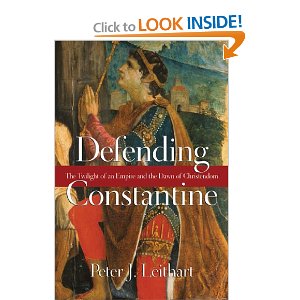Defending Constantine, by Peter Leithart
Constantine and the idea of “Constantinianism” has been under attack lately. Actually, it’s been under attack for centuries. But the debate today is about how the Church should be involved with the operations of the State. This is the focus of Defending Constantine, by Peter Leithart.
First, a simple backdrop. The Roman Emperor Constantine came to power in the early part of the fourth century. He converted to Christianity and ended persecution of the Christians throughout the Roman empire. Modern critics call this the beginning of the end of the good old days when Christianity was purer and more focused. Once the religious leaders attained power, they claim, the Church itself became corrupt. I’m oversimplifying this, but hey, it’s just a blog … I’m not pretending to be a scholar.
Leithart holds that Constantine and the results of his changes have gotten a bad wrap. His strongest points are that the critics get their history wrong. He goes on to argue that Constantine was instrumental in the spread of Christianity around the world and a key instrument of God’s divine hand.
Leithart might go too far, but I’m sympathetic to his arguments.
I’m not a big fan of the Church being involved with the State. Though I understand those who attempt to advocate for the values of the Church within the political system, I fear some of the more aggressive types who view their faith solely through the lens of political power. Or see the possible change of culture solely through that same lens.
So though I appreciate the concerns about the Church being in charge of the State, Constantine really has gotten a bad wrap. The problem with most of the arguments about Constantinianism is that the debate is within the theological and sociological realms. The people in this argument are not historians, and they attempt to fit Constantine into a narrative that fits their perspective rather than digging into the actual historical facts. The amount of nonsense out there about Constantine and what he supposedly did is appalling at times.
Further, many of the viewpoints are skewed by modern sensibilities. Which is to say they view Constantine through our modern pluralistic and democratic eyes. As Leithart says, “Theological critics of Constantine have surprisingly little to say about the historical context in which Constantine rose to the purple.” Or let me rephrase it this way: using Constantine as an example of how the Church lost its initial innocence, or that his use of power to influence society is somehow a bad thing, is to completely misunderstand the cultural, political and theological age in which he lived.
In the Roman world of the fourth century, politics and theology were inextricably mixed. To criticize Constantine for making Christianity central to his policies is to completely misunderstand how the Roman culture worked. For instance, critics argue that Constantine had entirely too much say in the crafting of the Nicene Creed, and Leithart agrees that emperors should leave that to theologians. But historically, did Constantine have too much say? It makes for a nice narrative to say he did, but he probably did not, and there certainly is virtually no historical evidence to say that he did.
Here’s my take on it. Constantine himself did a lot of good for the world and the Christian Church. In fact, I’d argue that he did more good than bad for the world and the Church. Obviously he was a man with many faults, and he’s not to be adored, but I’m thankful for the changes he implemented in the Empire.
So to me, the idea of Constantinianism is poorly named. The concept of Constantinianism is a legitimate conversation to have and a relevant issue for the Church today … it’s just too bad we call it that, because in truth Constantine was not a particularly good touchstone for the conversation about the Church and State relationship of today.
I liked this book because it sets the record straight. The book might be a bit too thick for some who are not into history the way I am. But if you are in the debate about Constantinianism, it’s a must read.

